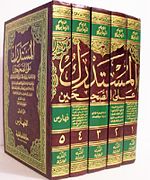- Al-Mustadrak alaa al-Sahihain
-
Al-Mustadrak alaa al-Sahihain (Arabic: المستدرك على الصحيحين; Al-Mustadrak 'ala al-Sahîhayn) is a five volume hadith collection written by Hakim al-Nishaburi d. 405H.
Contents
History
He wrote it in the year 393 AH (1002–1003 CE), when he was 72 years old. It contains 9045 hadith.[1] He claimed all hadith in it were authentic according to the conditions of either Sahih Bukhari or Sahih Muslim or both.[2]
Authenticity
The statement of authenticity was not accepted by a number of prominent later Sunni scholars. Al-Dhahabi, a 14th century Sunni Shafi'i Islamic scholar made an abridged version of the collection named Talkhis al-Mustadrak where he commented on its authenticity. It has become the habit of scholars today working in the field of hadîth, when compiling them and determining their authenticity, to say things like "It is authenticated by al-Hâkim and al-Dhahabî concurs". In doing so, they are referring to al-Dhahabi's Talkhîs, his abridgement of the Mustadrak that is often published along with it in its margins.[3]
Dhahabi also wrote:[4]
The Mustadrak contains a good number of hadîth that conform to the conditions of authenticity of both (al-Bukhârî and Muslim) as well as a number of hadîth conforming to the conditions of either one of them. Perhaps the total number of such hadîth comprises half the book. There is roughly another quarter of the hadîth that have authentic chains of transmission, but that have something else about them or that have some defect. As for the rest, and that is about a fourth, they are rejected and spurious narrations that are unauthentic. Some of those are fabrications. I came to know of them when I prepared an abridgement of the Mustadrak and pointed them out.
adh-Dhahabi lamented:
It would have been better if al-Hakim had never compiled it."[5]
Ibn Hajar Asqalani, a 15th century Sunni Islamic scholar states that Mawdu'at al-Kubra is as unreliable in its attributing the grade of being "forged" to certain ahadith as al-Hakim's Mustadrak is unreliable in its declaring the grade of "sound" or Sahih to many ahadith.[6]
Abridgment
Talkhis al-Mustadrak' is an abridged version of Al-Mustadrak alaa al-Sahihain, written by Al-Dhahabi. Al-Dhahabi in his Talkhis al-Mustadrak made an abridged version (a version with omitted material of the collection where he commented on its claimed authenticity). In that version, he added his comments on 1182 hadith. Al-Dhahabî in his encyclopedic Târikh al-Islam "The History of Islam" says the following in his biographical entry on al-Hâkim, wherein he speaks about his Mustadrak: "Some of those are fabrications. I came to know of them when I prepared an abridgement of the Mustadrak and pointed them out." al-Dhahabî said of it:[7] "|It is a useful book. I had made an abridgement of it that is in considerable need of work and editing."
On at least three other occasions, al-Dhahabi citicised hadith he had not commented on in his Talkhîs. For example, when speaking about Mu`âwiyah b. Sâlih,[8] he writes: "He is among those narrators whom Muslim accepts but not al-Bukhârî. You can see al-Hâkim relating this narrator's hadîth in his Mustadrak and say: 'This is according to the conditions of al-Bukhârî.' He repeatedly makes this mistake." However, when the same statement comes up in his Talkhîs, he says nothing about it .
There have been many prominent scholars who have assumed that al-Dhahabî's silence in his Talkhîs indicates his tacit approval of al-Hâkim's ruling, scholars of the caliber of Suyuti in al-Nukat al-Badî`ât (197) (15th century CE), al-Manâwî in Fayd al-Qadîr, and al-Husaynî in al-Bayân wa al-Ta`rîf . Many contemporary scholars follow this view as well, but some question that stance.
References
- ^ These figures are taken from the editorial introduction of Ibn al-Mulaqqin's Mukhtasar Istidrâk al-Dhahabî, 8–9 [1]
- ^ arshad. "Major Collections of Hadith". Members.cox.net. http://members.cox.net/arshad/hadithcol.html. Retrieved 2010-06-10.
- ^ "Al-Hakim’s Mustadrak & al-Dhahabî’s Talkhis". IslamToday. http://www.islamtoday.net/english/show_detail_section.cfm?q_id=839&main_cat_id=11.[dead link]
- ^ in his biographical encyclopedia entitled Siyar A`lâm al-Nubalâ' "Biographies of Outstanding Personalities" [2]
- ^ "Al-Hakim Al-Naysaburi". Sunnah.org. http://www.sunnah.org/history/Scholars/al_hakim_al_naysaburi.htm. Retrieved 2010-06-10.
- ^ stated in al-Qawl al-Musaddad fil-Dhabb `an Musnad al-Imam Ahmad (published by Shaykh Ahmad Shakir in his edition of the Musnad) [3]
- ^ Siyar A`lâm al-Nubalâ' (17/176)
- ^ Mîzân al-I`tidal (4/135)
The Six Books
(Al-Kutub al-Sittah)Sahih al-Bukhari · Sahih Muslim · Sunan an-Nasa'i al-Sughra · Sunan Abu Dawood · Sunan al-Tirmidhi · Sunan ibn Majah
Primary collections Sahifah Hammam ibn Munabbih · Musannaf ibn Jurayj · · Al-Muwatta · The Musannaf of Abd al-Razzaq · Musnad Ahmad ibn Hanbal · Sunan al-Darimi · Sahih Ibn Khuzaymah · Sahih Ibn Hibbaan · Al-Mustadrak alaa al-Sahihain · Mawdu'at al-Kubra · Tahdhib al-Athar
Secondary collections Types Commentaries Hadith terminology
and scienceBiographical evaluation Categories:- Sunni literature
- Hadith collections
- Hadith
- Sunni hadith collections
Wikimedia Foundation. 2010.

